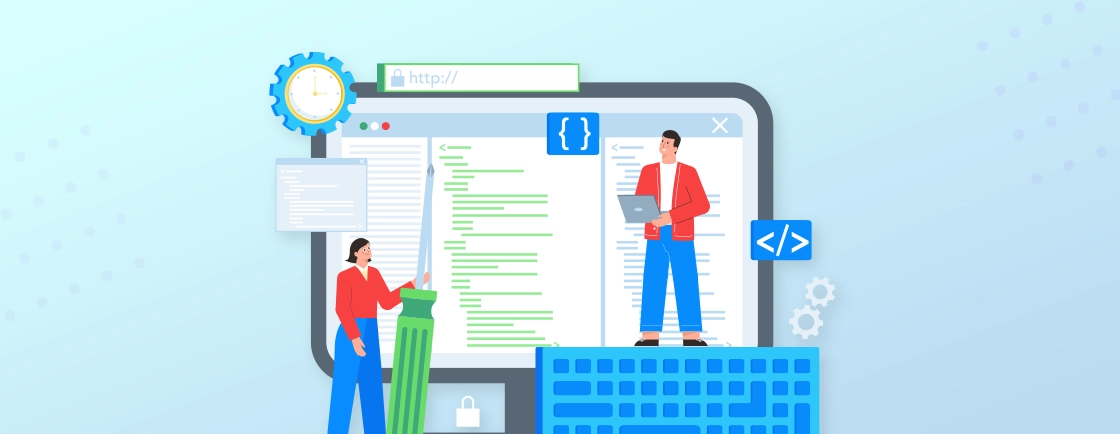Table of Contents
Java is among the most in-demand programming languages. Whether you are creating a dynamic web application or a mobile application that runs on multiple platforms, Java, as a platform, fits in quite well.
But Java developer skills today are much more than just writing code and knowing the syntax of the language. Ideally, sound theoretical foundations, practical exposure to different frameworks and different databases would be required.
Additionally, the seasoned Java developers continue to invent themselves with the latest in cloud technology and modern web practices. So your site or app gets the best design and development approach possible.
This article explores the role of Java developers, their key responsibilities, and the essential skills required to succeed in the field.
Who is a Java Developer?
Java developers are responsible for designing, developing, and maintaining Java-based applications. They usually handle different projects, i.e. web apps, microservices, enterprise software, etc. Such developers can also develop mobile apps for Android and iOS.
Skills of Java Developer are divided into 4 key parts:
- Backend Development: Building and handling server-side applications.
- Full-Stack Development: Working with both frontend and backend technologies.
- Mobile App Development: Developing applications for Android.
- Enterprise Development: Developing enterprise applications for large-scale businesses using Java EE.
Java developers are prevalent with web and app development in industries like finance, cloud computing, eCommerce, healthcare, and more. But what kind of responsibilities do they handle with the projects?
What are Java Developer’s Responsibilities?
The professionals with the correct skills in Java development are very instrumental in developing and maintaining large applications for almost all industries. Their responsibilities go beyond just writing codes.
Let’s take a look.
- Design and development of Java applications: Entails writing clean, efficient, and well-documented code based on project requirements.
- Software design: Java developers usually work on a project in the design phase. They take part in defining the architecture and technical specifications.
- Collaborate with other team members: They work closely with other developers, designers, testers, and project managers for successful project completion.
- Troubleshoot and debug code: Known issues in the job to identify and fix errors or problems in the code.
- Maintain and update existing applications: Modify, add new features, and keep the application functional and secure.
- Participate in code reviews: Review other developer’s codes to ensure quality adheres with coding standards.
- Stay up-to-date with Java technologies: The Java ecosystem is always evolving, so the developers need to learn new frameworks, libraries, and practices.
Java experts manage databases, implement security measures, and collaborate with other teams. That helps create high-performance applications meeting business needs. Mastering these responsibilities is essential to career advancement and making an impact at the tech level.
Must-have Java Developer Skills
Java developer skills encompass much more than just learning the syntax of the language. It is a combination of knowing core Java concepts, frameworks, databases, and modern development practices.
Good skills help developers create secure, scalable apps to satisfy the needs of a business and its users.
Core Java and Object-Oriented Programming
This is the fundamental basis. The developer is expected to know core syntax, data structures, algorithms, and OOP principles like encapsulation, inheritance, polymorphism, and abstraction. Otherwise, they cannot write efficient, maintainable, and scalable Java code.
- Syntax and Semantics: Understanding the building blocks of the Java language (variables, data types, operators, control flow statements).
- Exception Handling: Knowing how to write robust code using try-catch-finally blocks and different types of exceptions.
- Garbage Collection and Memory Management: Understanding the JVM’s manner of memory management and working of garbage collection.
- Encapsulation: Bundling up data and methods that act on that data within a single unit class.
- Inheritance: Creating subclasses based on existing class superclasses inheriting their properties and behaviors.
- Polymorphism: The capability for different classes to be handled using the same interface.
- Abstraction: The ability to encompass the implementation with a protective shield and expose only the relevant details to the user.
Competence in core Java empowers developers in writing extremely robust, maintainable, and optimized code for different applications.
Java Frameworks and Tools
Spring, Hibernate, and so on, are among the most popular Java frameworks. They lessen development time and complexity by providing out-of-the-box solutions for all common tasks. Furthermore, Java build tools like Maven and Gradle are essential for building and managing dependencies.
- Spring Framework: Including Spring Boot, Spring MVC, and Spring Security for enterprise application development.
- Hibernate and JPA: Object-Relational Mapping (ORM) for database integration.
- Microservices Development: Using Spring Boot and cloud-native technologies for modular applications.
- Java EE (Jakarta EE): Developing enterprise-level applications.
- JUnit: Writing unit tests to verify individual components of the code.
- Mockito: Creating mock objects for testing interactions between components.
- Git: All core concepts of GIT such as repositories, commits, branches, merging, and conflict resolution.
Mastering these frameworks brings productivity to a new level as well as means to build modern Java applications without much integration hassle.
Our team provides professional Web Development Services, helping businesses implement enterprise-grade Java applications using these frameworks efficiently.
Database Management
Most applications interact with databases to store and retrieve data. So Java developers need to understand database concepts. Plus, they need to know how to connect and interact with them using technologies like JDBC and JPA (Java Persistence API).
- SQL (Structured Query Language): Writing efficient queries for data manipulation (CRUD operations). Understanding joins, indexes, and database schema design.
- Database Concepts: Understanding relational database principles, normalization, transactions, and ACID properties.
- Specific Database Systems: Experience with popular databases like MySQL, PostgreSQL, Oracle, and SQL Server.
- DBC (Java Database Connectivity): Understanding how to connect to and interact with databases from Java applications.
- JPA (Java Persistence API): Use JPA to map Java objects to database tables and perform database operations in an object-oriented way.
Proficiency in databases ensures seamless data storage, retrieval, and performance optimization.
RESTful APIs and Web Services
Applications these days are bound together through the use of APIs. Java developers, for instance, would typically have built and consumed RESTful APIs for seamless communication.
- REST Principles: REST as an architectural style, statelessness, resource-based URIs, and HTTP methods (GET, POST, PUT, and DELETE).
- API Implementation: Java frameworks like Spring MVC (or WebFlux) or Jakarta EE in order to build RESTful APIs.
- Data Formats: Knowing common data formats like JSON and XML as API request and response bodies.
- API Documentation: Document API with tools such as Swagger/OpenAPI.
- API Security: Authentication and authorization mechanisms (e.g., OAuth 2.0, JWT) aimed at securing APIs.
Moreover, it is very important to understand RESTful APIs for application integration and smooth information interchange.
Cloud Computing and DevOps
Cloud platforms (AWS, Azure, GCP) have become the new standard for deploying applications and scaling applications. DevOps practices automate and eliminate bottlenecks in the complete lifecycle of software development.
- Cloud Platforms: Excellent knowledge of at least one major cloud provider, more often AWS, Azure, or Google Cloud Platform (GCP).
- Docker: Knowledgeable with Docker concepts, writing Dockerfiles, and building and managing Docker images and containers.
- Kubernetes (K8s): Understanding Kubernetes architecture for deploying and managing containerized applications. Work with Kubernetes concepts such as Pods, Deployments, and Services.
- CI/CD: Knowledge of principles and tools that automate the software building, testing, and deployment processes (e.g., Jenkins, GitLab CI, CircleCI).
Cloud and DevOps expertise helps Java developers deploy, manage, and scale applications efficiently.
Security Best Practices
With utmost consideration for security, the Java developer must write secure code against vulnerabilities, including SQL Injection, Cross-site Scripting (XSS), and authentication/authorization flaws.
- Secure coding practices: Impose security through application of techniques like input validation, output encoding, etc., to counteract the vulnerabilities.
- Authentication and Authorization: Implement secure authentication and authorization mechanisms using some of the latest technologies like OAuth 2.0, JWT, and role-based access control (RBAC).
- Security Libraries & Frameworks: Utilize security Java libraries and frameworks and those offered by the Java ecosystem such as Spring Security.
- OWASP Top 10: A general awareness of the OWASP Top 10 list of web application security risks.
Strong security practices keep data secure and compliant with industry standards.
Testing and Debugging
Composing robust tests such as unit, integration, and end-to-end tests makes the code quality assurance process and bug eradication easy. Good debugging skills are essential for identifying and fixing bugs as and when they show up.
- Testing Frameworks: Good knowledge in using JUnit, Mockito, and possibly other testing frameworks.
- Test-driven Development (TDD): Understand and implement the principles of TDD.
- Debugging Skills: Use IDE debug tools effectively to find out source code problems and solve them.
- Logging: Put into place good logging practices that enable effective debugging and a means of monitoring.
An application that has been tested and debugged well will become error-free with good UX.
Frontend Development Knowledge (Optional but Beneficial)
Although this might not always be considered a directive in the job description, a full-stack Java developer needs a fair frontend know-how. So they can seamlessly collaborate with their teams while app development occurs.
- Frontend Frameworks/Libraries: Familiarity with at least one popular framework/library such as React, Angular, or Vue.js.
- Frontend Build Tools: Awareness about tools such as Webpack or Parcel for bundling frontend assets.
- API Integration: Knowledge about consuming RESTful APIs from the frontend using the Fetch API or Axios.
- Responsive Design: Knowledge about creating websites that adapt to different sizes of screens.
Front-end know-how for Java developers helps them work well with UI teams to spawn better-integrated applications.
Developing expertise in Java requires continuous learning and hands-on experience with various tools and technologies. Our Java development experts have refined both technical and problem-solving skills. They stay competitive and advance in their careers.
Soft Skills for Java Developers
While Java developers essentially require technical skills, soft skills have almost equal importance. These skills act as very important ingredients for collaborative work, good communication, and general career advancement. With these abilities, developers can easily work in teams and adapt to changing working conditions.
Problem-solving and Critical Thinking
Developers come across all sorts of impediments all the time, from debugging problems to designing feasible solutions. Hence, problem-solving and critical thinking skills are a must. That is how they navigate obstacles while building sturdy applications.
Communication Skills
A developer should voice their requirements to other developers, testers, project managers, clients, and more. They need to clarify any misunderstanding and keep everyone updated.
Teamwork and Collaboration
Software development is rarely a solo effort. Developers have to work together in coding, designing, testing, and deploying systems so they can build a product that will truly thrive.
Adaptability and Continuous Learning
Technologies grow every day. Java developers must be adaptable and willing to constantly equip themselves to remain relevant in their practice.
Time Management and Prioritization
Developers typically work on multiple projects and tasks against set target dates. Proper time management and prioritization will ensure that they still deliver quality work on time.
Customer or Stakeholder Orientation
In the end, software is built for users and for business needs. A developer should understand, appreciate, and even fight for the interests of its customers and stakeholders. Then they will stand a good chance of creating a successful and far-reaching application.
Thus, soft skills will enable a Java developer to function properly within a team, solve complicated problems, and express ideas accordingly.
These skills increase productivity and, in turn, the expanding avenues of leadership. By merging technical skill and interpersonal acumen, these developers can stay imprinted in the tech world.
Let’s Conclude
A multifaceted skill set is the prerequisite for being a Java developer. Core Java, of course, forms the backbone of all Java development. However, a fully-fledged developer needs to have an understanding of frameworks, databases, APIs, and even cloud technologies.
Most important of all, these developers will need to nurture problem-solving and communication adaptability outside the technical ones. These attributes ensure that Java developers succeed in collaborative environments and can cope with the fast-paced technology world.
If you want to create the best web and mobile applications, connect with our Java professionals today!
FAQs on Java Developer Skills
Is it compulsory to study front-end technologies for a Java developer?
No. Over time, it has become highly advantageous acquiring but not compulsory front-end knowledge, that is, HTML, CSS, and JavaScript especially in stack roles. Knowing frontend development helps in better collaboration and getting a good view of the whole application.
How do I assess problem-solving skills in a Java developer?
Provide logical programming challenges that need algorithm skills from the candidates. Candidates should be asked to explain their approach and their thought process with the answer. Scenarios could involve real-world case studies and ask how they would debug them.
How can I assess a candidate’s communication skills during the interview process?
Note how concise and articulated they are when conveying technical concepts. Ask them to explain some concepts to a layman. Assess listening aptitudes in the process of responding to behaviors in articulation free from deviations.
What level of proficiency in testing and debugging should I expect?
The developer should know how to write unit tests (JUnit), understand integration testing, and use debugging tools. They should understand how to find and fix bugs, and appreciate the role of testing for the quality of code.
What are some common mistakes to avoid when hiring Java Developers?
Some common mistakes include too much emphasis on very specific niche skills without good core Java, ignoring soft skills, and setting unrealistic coding challenges. Don’t rush through interviews.
Explore Our Expert Guides
Dive into detailed tutorials, tips, and strategies designed to help you grow, innovate, and solve problems efficiently.





